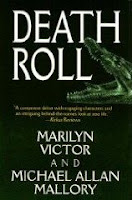There’s a Double Meaning in That
by Bethany Maines
In Much Ado About Nothing Beatrice and Benedick, the worst of rivals,
are set up by their friends to fall in love.
So that by Act 2, Scene 3, when Beatrice says, “Against my will I am
sent to bid you come into dinner,” Benedick
believes that Beatrice is madly in love with him, while Beatrice believes him to be an ass. After she exits, he says in all smugness, “Ha!
Against my will I am sent to bid you come
in to dinner. There’s a double meaning in that.”
are set up by their friends to fall in love.
So that by Act 2, Scene 3, when Beatrice says, “Against my will I am
sent to bid you come into dinner,” Benedick
believes that Beatrice is madly in love with him, while Beatrice believes him to be an ass. After she exits, he says in all smugness, “Ha!
Against my will I am sent to bid you come
in to dinner. There’s a double meaning in that.”
Someone I know once asked an
English teacher how he knew the author intended the symbolism the teacher was
accusing him of. The teacher replied, “It
doesn’t matter.” As an author this makes
me want to poke him in the eye just a little bit. But in the end he’s right; stories mean something
to a reader independent of the writer’s intentions. Each reader brings their own experiences to a
book and a writer can’t predict them. So
how can an author prevent his readers from pulling a Benedick and seeing double
meanings where none are intended?
English teacher how he knew the author intended the symbolism the teacher was
accusing him of. The teacher replied, “It
doesn’t matter.” As an author this makes
me want to poke him in the eye just a little bit. But in the end he’s right; stories mean something
to a reader independent of the writer’s intentions. Each reader brings their own experiences to a
book and a writer can’t predict them. So
how can an author prevent his readers from pulling a Benedick and seeing double
meanings where none are intended?
It’s a very secret and advanced
technique called (wait for it): educated guessing. And good beta readers. As an author I try to learn about other
points of view, so that I can write stronger more realistic characters and then
I rely on my writers group to read through a piece and throw up flags around
text that might unintentionally carry a subtext that’s either offensive or
poorly thought out. It’s hard to think
that something I’ve written could be construed as offensive, because after all,
I am I and I’m awesome and I have only the best of intentions. But we all have prejudices or periodically spout
unexamined notions that have been fed to us by society.
technique called (wait for it): educated guessing. And good beta readers. As an author I try to learn about other
points of view, so that I can write stronger more realistic characters and then
I rely on my writers group to read through a piece and throw up flags around
text that might unintentionally carry a subtext that’s either offensive or
poorly thought out. It’s hard to think
that something I’ve written could be construed as offensive, because after all,
I am I and I’m awesome and I have only the best of intentions. But we all have prejudices or periodically spout
unexamined notions that have been fed to us by society.
An easy example is “pink is only
for girls”. This statement is both
observationally false (been to the mall lately?), and historically inaccurate (pink
used to be a boys color). Color is a product of light bouncing off a
surface or being absorbed (we see the portion of the spectrum bounced back);
any deeper meaning has been assigned to a color by humanity. So unless my
character is a sexist and I need him or her to say total nonsense about gender
roles, I probably shouldn’t write that and a good beta reader should flag it as
a problem. With any luck I can keep the
unintentional double meanings to a minimum. I don’t want to be a Benedick.
for girls”. This statement is both
observationally false (been to the mall lately?), and historically inaccurate (pink
used to be a boys color). Color is a product of light bouncing off a
surface or being absorbed (we see the portion of the spectrum bounced back);
any deeper meaning has been assigned to a color by humanity. So unless my
character is a sexist and I need him or her to say total nonsense about gender
roles, I probably shouldn’t write that and a good beta reader should flag it as
a problem. With any luck I can keep the
unintentional double meanings to a minimum. I don’t want to be a Benedick.
Bethany Maines is the author of the Carrie
Mae Mysteries, Tales from the City of
Destiny and An Unseen Current.
You can also view the Carrie Mae youtube video
or catch up with her on Twitter and Facebook.
Mae Mysteries, Tales from the City of
Destiny and An Unseen Current.
You can also view the Carrie Mae youtube video
or catch up with her on Twitter and Facebook.








